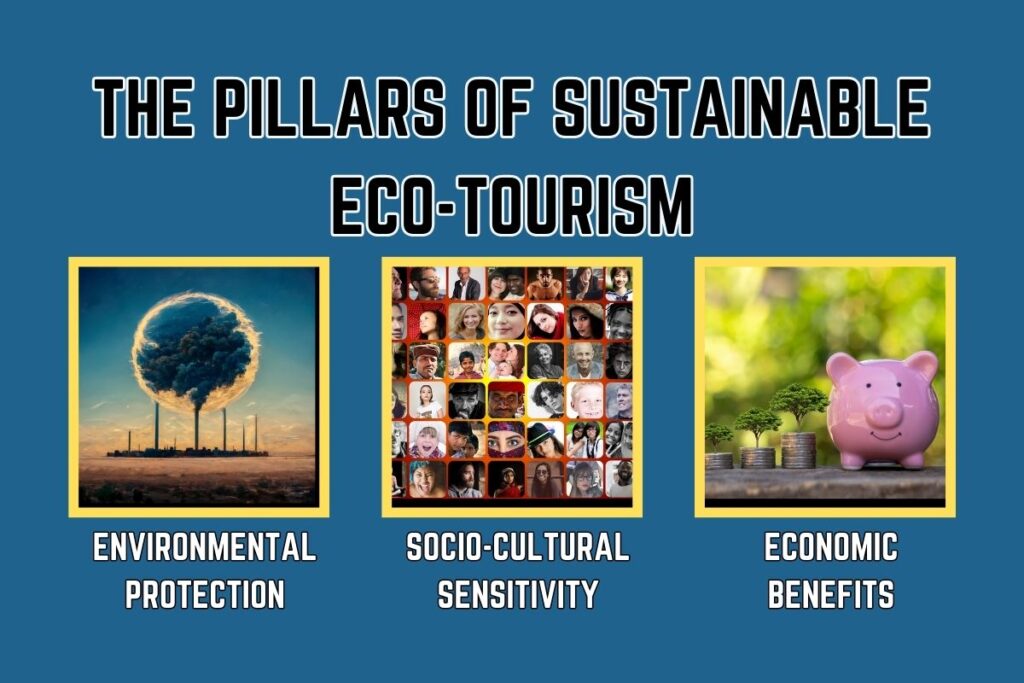In recent years, there has been a surge of interest worldwide in sustainable eco-tourism. However, it is crucial to understand the distinction between sustainable eco-tourism and regular travel. This blog, therefore, aims to shed light on the conceptions of sustainable travel and nature tourism while delving into their environmental impact.
What is Sustainable Eco-Tourism?
Understanding the Essence of Sustainable Travel
Traveling entails conserving natural resources and supporting local communities, with a primary focus. Furthermore, the aim is to balance satisfying tourist desires while preserving the environment for future generations.
The Pillars of Sustainable Eco-Tourism
It rests on three fundamental pillars:
- Environmental Protection: By minimizing pollution, conserving ecosystems, and respecting wildlife habitats, sustainable travel ensures the preservation of natural resources.
- Socio-cultural Sensitivity: It emphasizes understanding and respecting local cultures, traditions, and communities, promoting authentic and mutually beneficial experiences.
- Economic Benefits: It generates income and job opportunities for local communities, empowering them and encouraging the preservation of their natural and cultural heritage.

Differentiating Sustainable Travel and Eco-Tourism
While sustainable travel and eco-tourism share similar goals, they differ in their approaches.
| Sustainable Travel | Eco-Tourism |
| Sustainable travel encompasses various forms of responsible tourism, including eco-tourism. | On the other hand, eco-tourism, a subset of sustainable travel, focuses specifically on nature-based experiences. |
| It emphasizes minimizing negative environmental and social impacts while maximizing positive contributions to local communities and the planet. | It highlights the conservation of natural areas and promotes environmental education, raising awareness among travelers about the importance of biodiversity and ecological sustainability. |
The Key Similarities of Sustainable Travel and Eco-Tourism
Both sustainable travel and eco-tourism prioritize environmental protection, local economic development, and cultural understanding. In addition, these encourage a sense of accountability and seek to have a good, long-lasting effect.
The Impact of Sustainable Travel and Eco-Tourism on the Environment
Preservation of Natural Resources
It endeavors to conserve natural resources by promoting exercises such as energy efficiency, waste reduction, and water conservation. It encourages travelers to respect the delicate balance of ecosystems.
Biodiversity Conservation
By participating in sustainable eco-tourism activities, travelers significantly contribute to preserving biodiversity. Additionally, these activities encompass wildlife conservation projects, habitat restoration, and responsible wildlife viewing practices.
Minimizing Carbon Footprint
They play an active role in reducing greenhouse gas emissions. Moreover, they promote alternative transportation methods while supporting local economies and opting for eco-friendly accommodations. As a result, these efforts make a vital contribution to mitigating the impacts of climate change.
Addressing the Challenges
Despite its merits, sustainable eco-tourism must confront challenges such as over-tourism, transportation emissions, and the commodification of nature.
Conclusion
By embracing sustainable eco-tourism, we can actively explore the world while taking meaningful steps toward environmental preservation. Additionally, by adopting responsible practices, supporting local communities, and minimizing our ecological impact, we ensure that future generations will have the chance to marvel at the wonders of our planet. Consequently, let’s go on the journey, making a difference with each excursion we embark on.
Also, read “Types of Accommodations: Exploring the Benefits and Drawbacks.”










